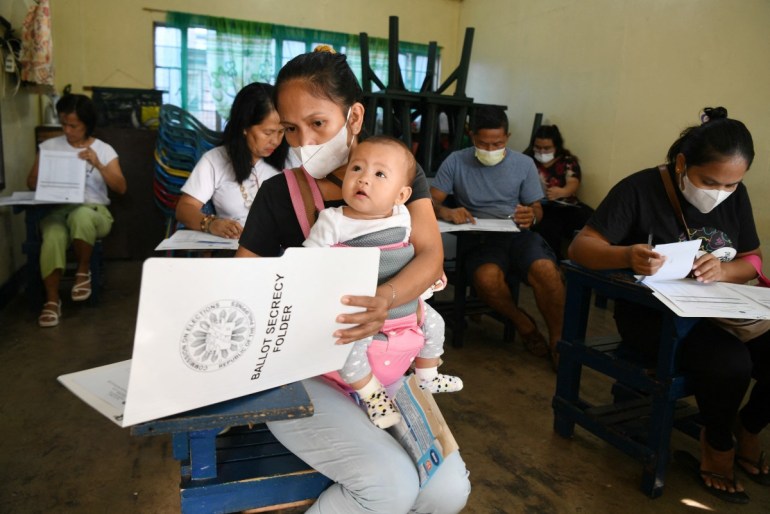More than 300,000 police officers and soldiers are deployed to secure polling stations in more than 42,000 villages.
At least three people have been killed in the restive southern Philippines as millions turned out to vote for village leaders following months of deadly poll-related violence.
Security forces were on high alert across the country on Monday as the long-delayed nationwide vote for more than 336,000 council positions got under way.
While villages are the lowest-level government unit, the council posts are hotly contested because they are used by political parties to cultivate grassroots networks and build a support base for local and general elections.
More than 300,000 police officers and soldiers have been deployed to secure polling stations in more than 42,000 villages.

Elections are a traditionally volatile time in the Philippines, which has lax gun laws and a violent political culture.
Two people were killed and five others were wounded on Monday outside a polling station in Maguindanao del Norte province on the southern island of Mindanao, police said.
The shootout happened during a confrontation between supporters of rival candidates for village captain, said Datu Odin Sinsuat municipality police chief Lieutenant-Colonel Esmail Madin.
In another incident, a woman was killed when a gunfight broke out after a van carrying a village captain and her supporters was stopped on a road by people backing her rival in Lanao del Norte province, the army said.
In the capital, Manila, voters waited in long lines to cast their ballots at schools being used as polling venues.
“This is important for the people … we need to be able to consult someone over our problems,” said Rosemarie Garcia in the Tondo neighbourhood.
“We need somebody who is easily approachable to his or her constituents.”
Previous election violence
In 2009, before it was divided into two provinces, Maguindanao was the scene of the country’s deadliest single incident of political violence on record.
Fifty-eight people were massacred as armed men allegedly working for a local strongman attacked a group of people to stop a rival from filing his election nomination.
In the run-up to Monday’s vote, there were 30 confirmed incidents of election-related violence, compared with 35 in 2018, the Philippine National Police said on Sunday, without providing an updated breakdown for the number of dead and injured.
About one-third of the incidents happened in the Bangsamoro Autonomous Region in Mindanao.
Previous police data showed eight people were killed and seven injured in poll-related violence between August 28 and October 25.

More than 67 million people are registered to vote in the elections, which President Ferdinand Marcos Jr described on Monday as “very important” for higher-level politicians.
“What happens here in the barangay [village] … are going to have an effect on the results of the mid-term elections and subsequently at the national elections,” Marcos said after casting his vote in his family’s stronghold of Batac City in the northern province of Ilocos Norte.
“If other barangays tell you ‘I will deliver 350 votes for you in my barangay’, rest assured, you will get 350. That’s why the result is very important.”
Voters will choose a village captain and seven councillors responsible for implementing national policies, resolving neighbourhood disputes and providing basic public services.
Village councils also enable politicians to “disseminate funds and other favours to secure votes”, said Maria Ela Atienza, a political science professor at the University of the Philippines.
Village elections are supposed to be held every three years, but the last vote was in 2018.
They were postponed by then-President Rodrigo Duterte and then his successor Marcos on the grounds that the government could not afford them.
Sumber: www.aljazeera.com
 Skip to content
Skip to content

